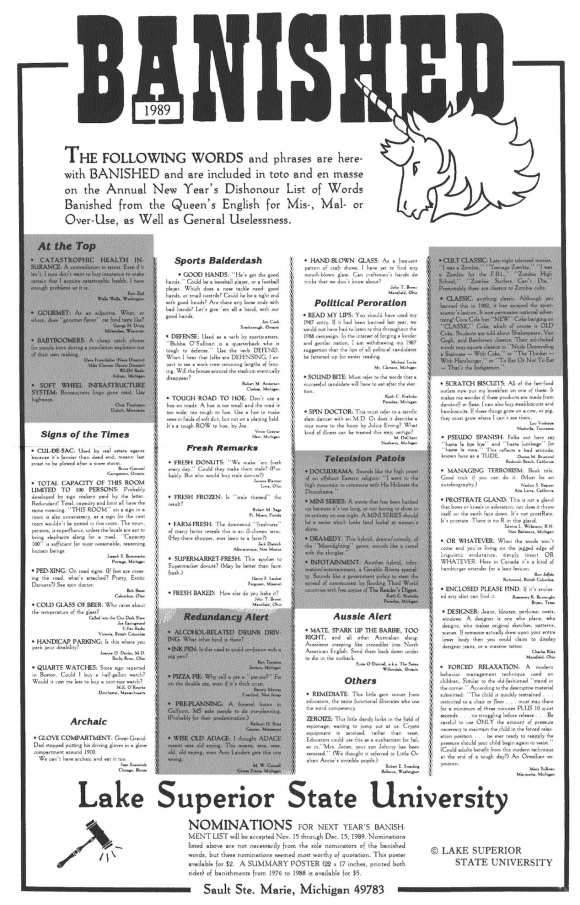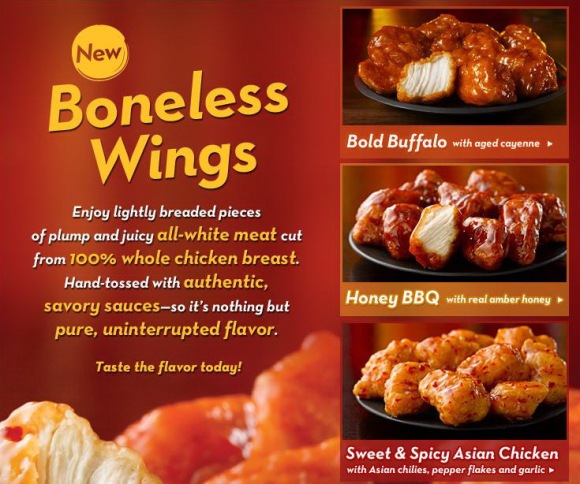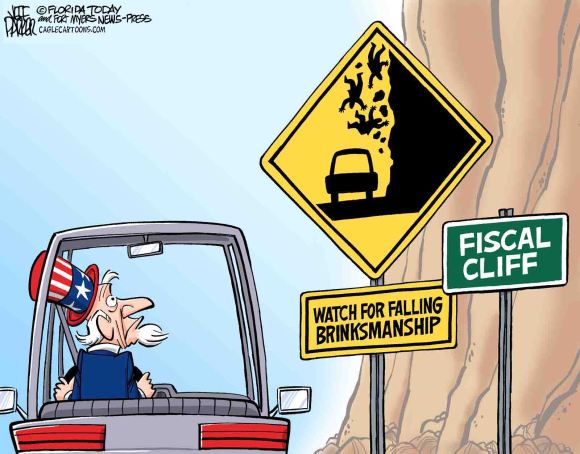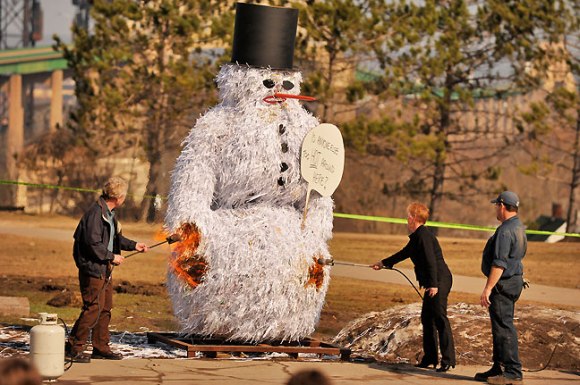New Year’s eve brings annual traditions and resolutions. We watch the ball drop in Times Square. We countdown to midnight with a glass of champagne. We vow to drop a few pounds starting the next day.
As we continue our focus on Words, Collaborative Services came across a small university in Michigan with a big annual tradition, one that attracts world-wide attention. On New Year’s Day for the past 38 years Lake Superior State University (LSSU) has released their “Annual List of Words to be Banished from the Queen’s English for Mis-use, Over-use and General Uselessness.” The list of banished words is compiled from thousands of nominations received throughout the year. While the list isn’t officially enforced, it does have an avid following and brings great publicity to the state’s smallest public university.
As for the nominated words, you know them…probably too well. Most of the nominations are for words that are overused in the media and pop culture. Words we’ve heard (fiscal cliff) over (fiscal cliff) and over (fiscal cliff) again (fiscal cliff). These are the words we wish we could hurl off a cliff (fiscal cliff?), never to be used again. Certain words and phrases have a way of catching on and sticking with us, some eventually becoming incorporated into every-day vocabulary, giving them a fate worse than death…eternal life!
LSSU’s annual list provides an outlet for people to voice their frustration over their favorite mis-used, over-used, and useless word and in turn they have the chance to see it banished.
As we continue to explore words this month, Collaborative Services caught up with Thomas Pink, LSSU’s Director of Public Relations and member of the committee who decides which words and phases to banish. We wanted to know how the banished words are chosen, why certain words and phrases garner such strong reactions from people, and some of the candidates for next year’s list. We welcome his insights.
– – –
LSSU’s annual list of banished words is in its 38th year. How did it begin?
The list began at a New Year’s Eve party in 1975, when former LSSU Public Relations Director Bill Rabe was talking with some friends about words and phrases that drove them crazy. Someone mentioned that there should be a “dishonor” list for words and phrases in the English language, an antithesis to the annual New Year’s Queen’s Honour List, and they came up with the “Annual List of Words to be Banished from the Queen’s English for Mis-use, Over-use and General Uselessness.” Bill wrote his friend’s suggestions on a cocktail napkin, and when everyone else went to bed, he wrote a story about the new list. Bill was an astute reporter and he was a genius when it came to getting international publicity for LSSU, the smallest of Michigan’s public universities. He figured the story would get some play on New Year’s Day, typically a slow news day, and he was correct. He said when responses to the story started coming in to his office in the form of letters and phone calls, he knew that he was on to something. He turned those replies into nominations for the next year’s list.
How many nominations do you receive each year and how are they submitted?
We receive a few thousand nominations. These days, they come through e-mail (banish@lssu.edu) and through our web page (lssu.edu/banished) and some through our Facebook page. We prefer e-mail and the link through our web page because it is easier to sort through them and the web page prompts fans to include a good reason for banishment – something other than “I hate this word.” When the list started, the office would receive hundreds of letters and postcards with nominations. In the early 1990s, the bulk still came through mail, but many came through the fax machine. These days, we rarely get hard copy nominations.
Who makes up the committee that makes the final decision on which words and phrases to banish?
The core of the committee is made up of me and John Shibley, the campus photographer/writer. We involve anyone who is interested, but because we often do the bulk of the work during the holiday break in December, it’s sometimes tough to get assistance. So it varies from year to year. Faculty and staff have helped. Students have helped. A couple years we had local kids attending out-of-town schools who helped when they were home on break. One of them was able to get some academic credit for her work on the project.

LSSU’s Thomas Pink and John Shibley have been banishing words since 1989.
(Credit: Lake Superior State University)
What makes people react so strongly to certain words?
Most of the words and phrases that are nominated are for “overuse.” When they send in nominations, people often write things such as, “If I hear a politician utter this phrase one more time…” or “My teen-aged son uses this word constantly!” The way that news is communicated these days contributes to how much words get under peoples’ skin. Sound bites get picked up and played over and over again. That’s one way, anyway. Some people just have pet peeves with certain words. My college speech professor used to stop us in the middle of our presentations if he heard us say the phrase “you know” or “y’know.” He’d say, “No! We don’t know. You tell us!” If he had nominated “yuh know” for banishment – and he may have, since he was one of Bill Rabe’s best friends – he would have said, as he so often did, “Y’know has got to go.”

YOLO, the acronym for “You Only Live Once”, made LSSU’s 2013 list of Banished Words.
(Credit: BrandNuThreads)
Some of the words like “boneless wings” and “superfood” just don’t make sense. Why do you think these words catch on so quickly and stay with us?
Again, we believe it has much to do with the way we communicate electronically. An advertising term such as “boneless wings,” or a cute word used to describe foods that are better for you than others, “superfoods,” is used by someone in their advertising or writing and people find it interesting – for a while. Then others use it in their writing and in their communication to friends. It spreads quickly. A word or phrase can go from “cool” to “I hate it!” in less than 24 hours these days.
The phrase that received the most nominations this year (2012) was “fiscal cliff.” Why do you think this word took the top spot compared to the others on the list?
We believe this one rose to the top because of its association with politicians and the economy. Its overuse in the news cycle contributed to its infamy. We receive a fair number of political nominations every year, but that number increases during presidential election years. People love to hate politicians and their follies no matter what, so when you get a phrase like this that’s waved in their faces over and over, and it relates to political action – or inaction, as in this case – it’s ripe for banishment.
Why has LSSU continued the tradition of banishing words?
Our favorite answer to this question is, “Because no one will let us stop.” John Shibley and I have been associated with the list since 1989, longer now than Bill Rabe, its creator, was involved with it. Each year we wonder if people will lose interest, but as soon as the list is released on New Year’s Eve, we can tell from the response that we’ll have enough nominations for next year’s list. The nominations come from around the world. Most come from the U.S., and many from Canada, but a fair number also from the U.K. and Australia. We’ve always received a nomination or two from far-flung places, mostly from U.S. service men and women stationed overseas.
We’re grateful for the interest. Bill Rabe created the list as one of several ways of gaining attention for LSSU, which was then and still is Michigan’s smallest public university. We pride ourselves on being able to provide personal attention to students because of our size (3,000 students) but of course we still need to let future students and parents know about us. Banishing words is one way of accomplishing that. It leads prospective students and others to our website to find out more about our school. As we mentioned, Bill was a genius when it came to coming up with low-cost ways of promoting LSSU. Word Banishment is one of them. He started the tradition of burning a snowman on the first day of spring back in 1971, and that is something we continue, also.
Radio shows, especially, love the list. In early December, we start hearing from reporters who want to make sure that they are on our mailing list. In the days before New Year’s eve and for a couple weeks afterward, we start doing radio interviews – some live, some taped, anywhere from three minutes on a morning show to hour-long, call-in talk shows.
Are you already receiving nominations for words to be added to next year’s list of banished words? Can you share any with us?
Yes. There are hundreds in the mailbox already. Many have already made the list in the past. We don’t start looking at them seriously and weeding them out until the fall, but some that are catching our eyes are listed below. This does not mean they will make the list on New Year’s Eve.
Lockdown – appears to be a response to the Boston bombings and other recent crimes that put schools, neighborhoods or entire towns on “lockdown” while police investigate.
Instagramming – follows along with “Facebooking,” “Googling” and other nouns turned into verbs.
Mr. Mom – For some reason, we received over a dozen nominations in February and March from many different states for this one. None of them mention over-use in the news, so it’s interesting to see that one catching so much attention. They all mention it as being insulting – perhaps it’s a reflection on the economy, with more fathers out of work and staying home while mom works. We’ll see how that shakes out over the year. One guy says, “I am a stay-at-home dad/parent. And if you call me “Mr. Mom,” I will punch you in the throat.”
(So I guess we could add to the earlier question that we’re performing a public service by letting people vent.)
Craft Beer – Just like “hand-crafted latte” in 2004, this person asks, “Aren’t they all crafted? Are we supposed to believe each glass of beer is ‘crafted’ after we order it?”
Sometimes a word or phrase only needs one nomination to make it on the list. I’ve only seen one so far for “breastaurant.” The person from California who nominated it says it’s a ridiculous word used to describe restaurants/bars such as “Hooters, Twin Peaks and Bikinis Sports Bar and Grill, etc…You know, those places for people who are too uptight for strip clubs and too libertine for Applebees and Fridays.”
A person from North Carolina nominates the phrase, “I thought to myself,” and asks, “Who else can you think to?”
Bill Rabe had a great sense of humor and liked entries that would make him laugh. We do, too.
What is your favorite word or phrase that has been banished and why?
That’s a tough one. Not only are there so many words and phrases to remember, but there are many that make us laugh. I liked “alcohol-related drunk driving” from 1989 and remember someone else nominating “legally drunk” and asking if someone could be “illegally sober.” I still grind my teeth when I hear “safe haven” in the news, and “co-conspirators.” “Pre-planning” is another word that one hears often. Really? (“Really” made the list in 1979, but “Really?” has been nominated often over the past few years and will probably make the list soon.)
As much as we like to laugh at the nominations, none of us on the committee claims to be a word expert. In interviews, we remind people that we make as many mistakes as anyone else. We also point out that the list at least causes us to think a bit more about how we communicate, and that’s a good thing.
– – –
To see the 2013 list of banished words click here. Is there a word or phrase that you would like to banish? Send your nomination to banish@lssu.edu or submit it online at lssu.edu/banished and see if it makes it on next year’s list.
Liz Faris, Associate
Collaborative Services, Inc.








Recent Comments